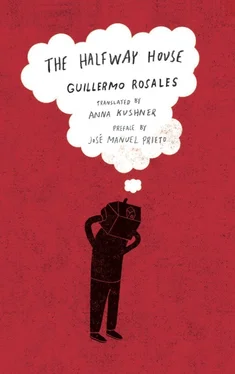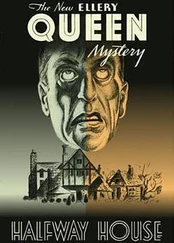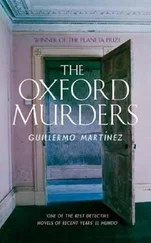“Well you don’t need to,” I say. “Your technique is similar. Have you ever painted oils?”
“No.”
“Learn to paint with oils,” I say. “Give some color to these drawings. Listen!” I say, taking her strongly by the neck. “You are a good artist. Goooood.”
She smiles. I squeeze my hand a little tighter and her eyes fill with tears. But she keeps smiling. I feel a wave of desire washing over me again. I let go of her. I go over to the room’s door and lock it again. I go over to her gently and start to kiss her arms, her armpits, the nape of her neck. She smiles. I kiss her slowly on the mouth. Once again, I throw her down on the bed and take out my penis. Pulling aside her small panties with my fingers, I penetrate her slowly.
“Kill me,” she says.
“You really want me to kill you?” I ask, sinking into her completely.
“Yes, kill me,” she says.
I get a hand on her neck and start to squeeze forcefully again.
“Bitch!” I say, suffocating her and penetrating her at the same time. “You’re a good artist. You draw well. But you need to learn about color. Colooor.”
“ Ay! ” she says.
“Die!” I say, feeling myself dissolve between her legs again.
We remain that way for a while, totally undone. I’m kissing her cold hand. She’s playing with my hair. I stand up. I straighten my shirt. She lowers her dress and sits on the edge of the bed.
“Listen,” I say to her. “Do you want to go for a spin with me?”
“Where to, my angel?”
“Around!”
“Okay.”
We leave. When we get to the street, Frances presses against me and grabs my arm.
“Where are we going?” she says.
“I don’t know.”
I look up and down the street. Then I point vaguely at a place they call Little Havana. We start to walk. This might be the poorest ghetto of the Cuban section. Here live the great majority of the 50,000 who arrived on Miami’s shores in that last spectacular exodus of 1980. They haven’t been able to get a leg up yet, and you can see them any time of day sitting in the doorways of their homes, sporting shorts, brightly colored t-shirts and baseball hats. They flaunt thick gold chains on their necks with medallions of saints, Indians and stars. They drink canned beer. They fix their rundown cars and listen, for hours on end, to loud rock or exasperating drum solos on their portable radios.
We walk. When we get to 8th Street, we turn to the right and head toward the heart of the ghetto. Bodegas, clothing stores, opticians, barber shops, restaurants, coffee shops, pawn shops, furniture stores. All of it small, square, simple, made without any architectural artifice or aesthetic concerns. Created to make a few cents and thus cobble together that petit bourgeois life-style to which the average Cuban aspires.
We walk on. We walk on. When we reach the big, gray arcade of a Baptist church, we sit at the foot of one of the pillars. A protest march of old people passes on the street, toward downtown. I don’t know what they’re marching for. They raise signs that say, “Enough already!” and they’re waving Cuban and American flags. Somebody comes over to us and gives us both typewritten pieces of paper. I read:
It’s time. The “Cuban Avengers” group has been started in Miami. From today on, take heed all the indifferent, the mean-spirited, the closet communists and all those who enjoy life in this hedonistic and bucolic city while an unhappy Cuba moans in chains. “Cuban Avengers” will show all Cubans the path to follow.
I crumple up the piece of paper and throw it out. I start laughing. I lean against the pillar and look at Frances. She gets closer to me and sinks her shoulder into my ribs. She takes one of my arms and places it over her shoulder. I squeeze her a little more and kiss her head.
“My angel,” she says. “Were you ever a communist?”
“Yes.”
“Me too.”
We’re silent. Then she says,
“At the beginning.”
I lean my head back against the pillar and sing an old anthem from the early years of the Revolution in a low voice:
Somos las brigadas Conrado Benítez
Somos la vanguardia de la revolución
She continues:
Con el libro en alto, cumplimos una meta
Llevar a toda Cuba la alfabetización
We burst out laughing.
“I taught five peasants how to read,” she confesses.
“Oh yeah? Where?”
“In the Sierra Maestra,” she says. “In a place called El Roble.”
“I was around there,” I say. “I was teaching some other peasants in La Plata. Three mountains from there.”
“How long ago was that, my angel?”
I close my eyes.
“Twenty-two … twenty-three years ago,” I say. “Nobody understands that,” she says. “I tell my psychiatrist and he just gives me strong Etrafon pills. Twenty-three years, my angel?”
She looks at me with tired eyes.
“I think I’m dead inside,” she says.
“Me too.”
I take her by the hands and we stand up. A black convertible goes by in front of us. A Miami teenager sticks his head out and yells at us, “Trash!”
I flash him the longest finger on my hand. Then I squeeze Frances’ hand and we start walking back to the halfway house. I’m hungry. I’d like to eat, at the very least, a meat empanada. But I don’t have a single cent.
“I have two dimes,” says Frances, untying a handkerchief.
“They’re no good. Everything in this country costs more than twenty-five cents.”
Nonetheless, we stop in front of a coffee shop called La Libertaria .
“How much is that empanada?” Frances asks an old server who looks bored behind the counter.
“Fifty cents.”
“Oh!”
We turn around. When we’ve gone a few steps, the man calls out to us.
“Are you hungry?”
“Yes,” I reply.
“Are you Cuban?”
“Yes.”
“Man and wife?”
“Yes.”
“Come in, I’ll give you something to eat.”
We go in.
“My name is Montoya,” the man says as he cuts two big slices of bread and starts to put ham and cheese on them. “I’ve also had rough times in this country. Don’t tell anyone I said so, but this country will eat you alive . I’m Montoya!” He says again, adding two large pickle slices between the bread slices. “I’m an old revolutionary. I’ve been imprisoned under every one of the tyrannies Cuba has suffered. In 1933, in 1952 and most recently, under the hammer and sickle.”
“Anarchist?” I ask.
“Anarchist,” he confesses. “My whole life. Fighting the Americans and the Russians. Now I’m very peaceful.”
He puts the open-faced sandwiches, all ready, on the counter and invites us to eat. Then he takes out two Coca-Colas and sets them in front of us.
“In 1961,” he says, leaning forward on his elbows over the counter, “Rafael Porto Penas, lame Estrada, the now-deceased Manolito Ruvalcaba, and I were all together in the same car with Fidel Castro. I was at the wheel. Fidel was without his bodyguards. Lame Estrada looked him right in the eye and asked, ‘Fidel … are you a communist?’ And Fidel replied, ‘ Caballeros , I swear to you by my mother that I am not a communist nor will I ever be one!’ See what kind of guy he is!”
We burst out laughing.
“Cuban history isn’t written yet,” Montoya says. “The day I write it, the world will end!”
He goes over to two customers who just walked in and Frances and I take the opportunity to eat our sandwiches. We eat and drink in silence for a few minutes. When we’re done, Montoya is in front of us again.
“Thank you,” I say.
He stretches his hand out to me. Then he extends it to Frances.
Читать дальше












